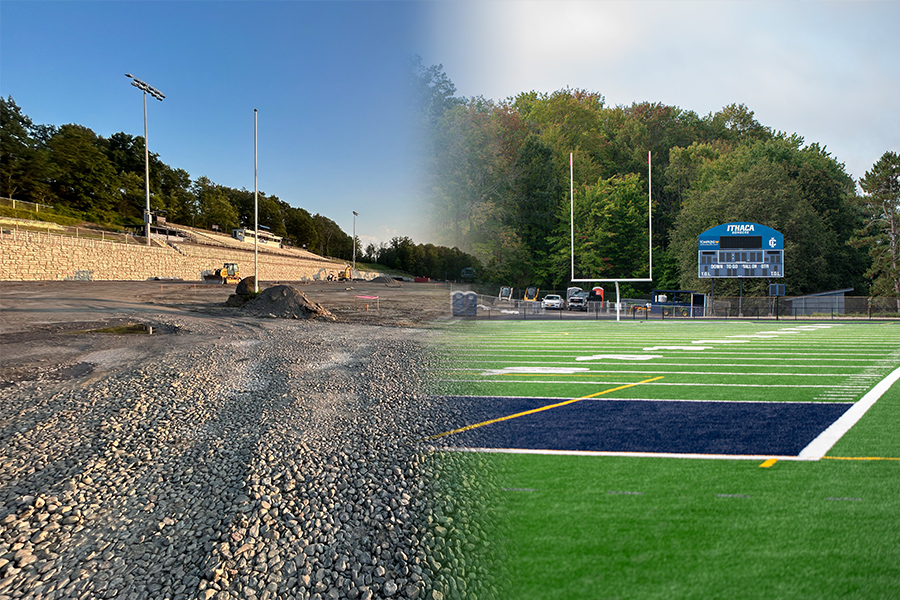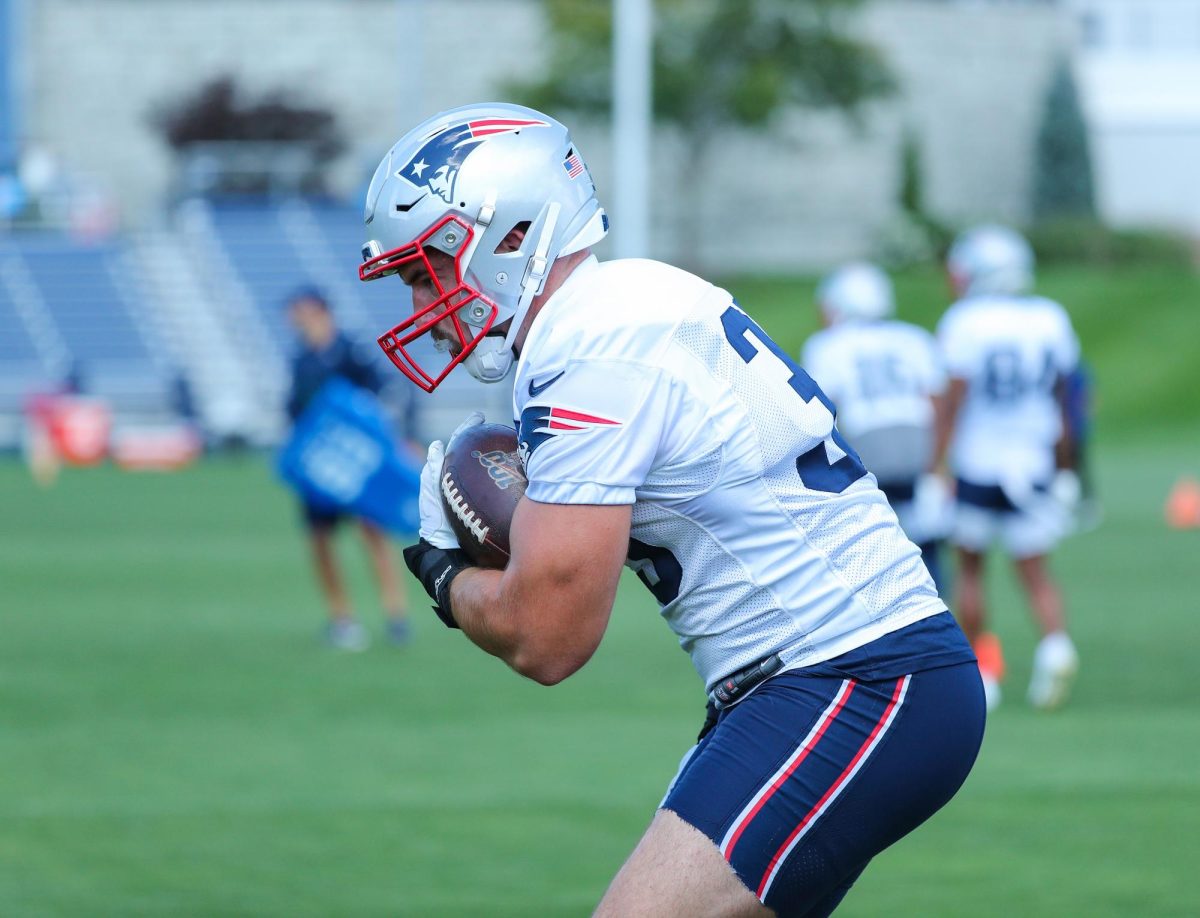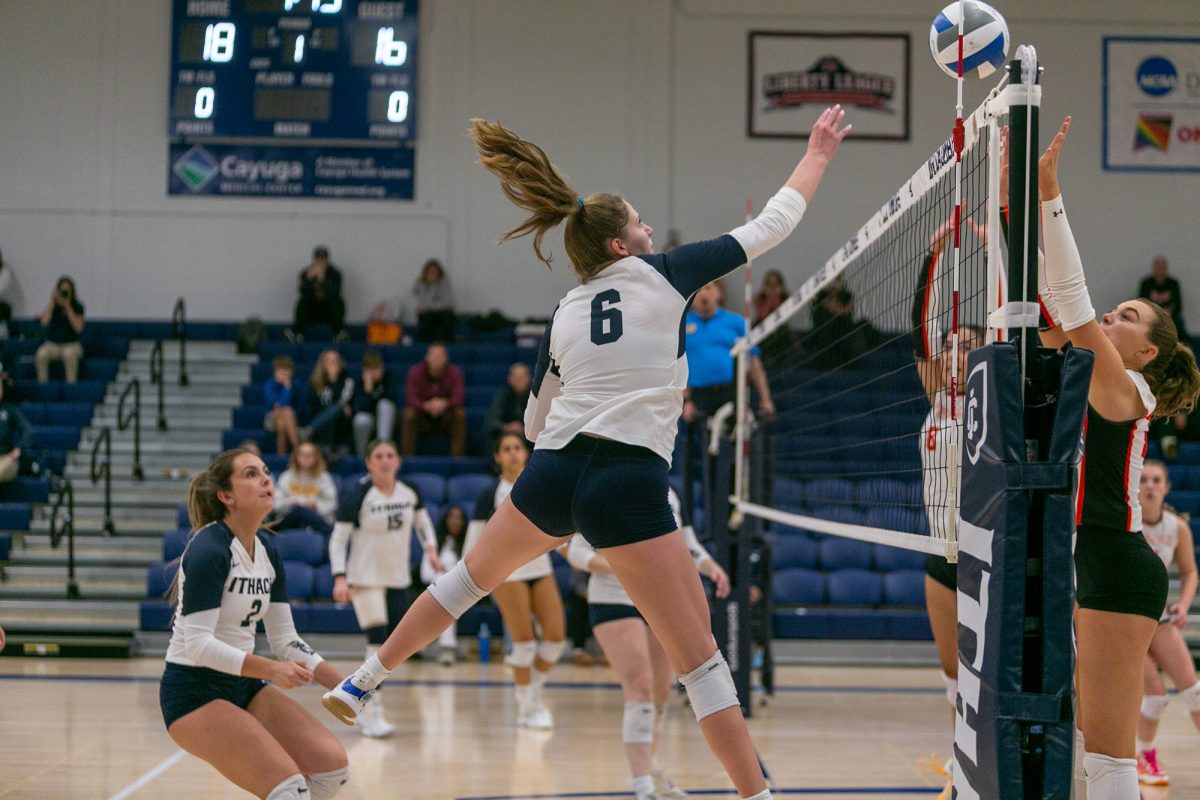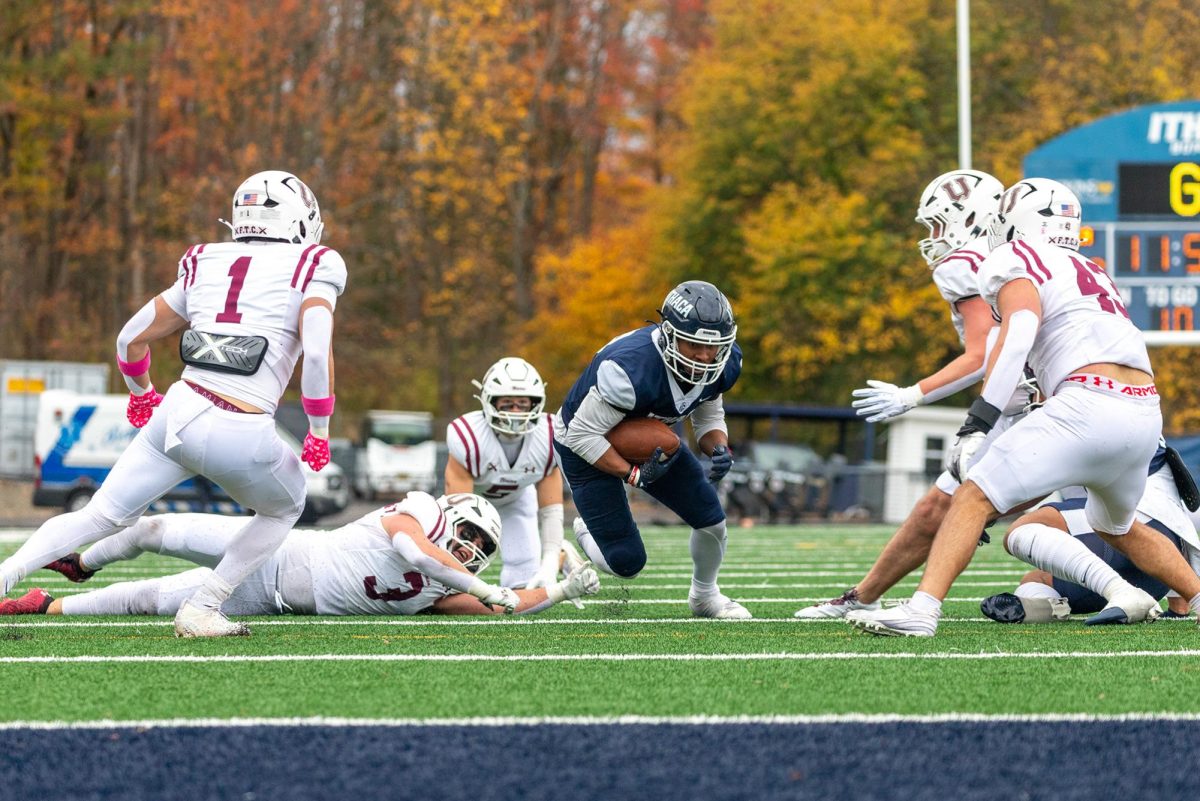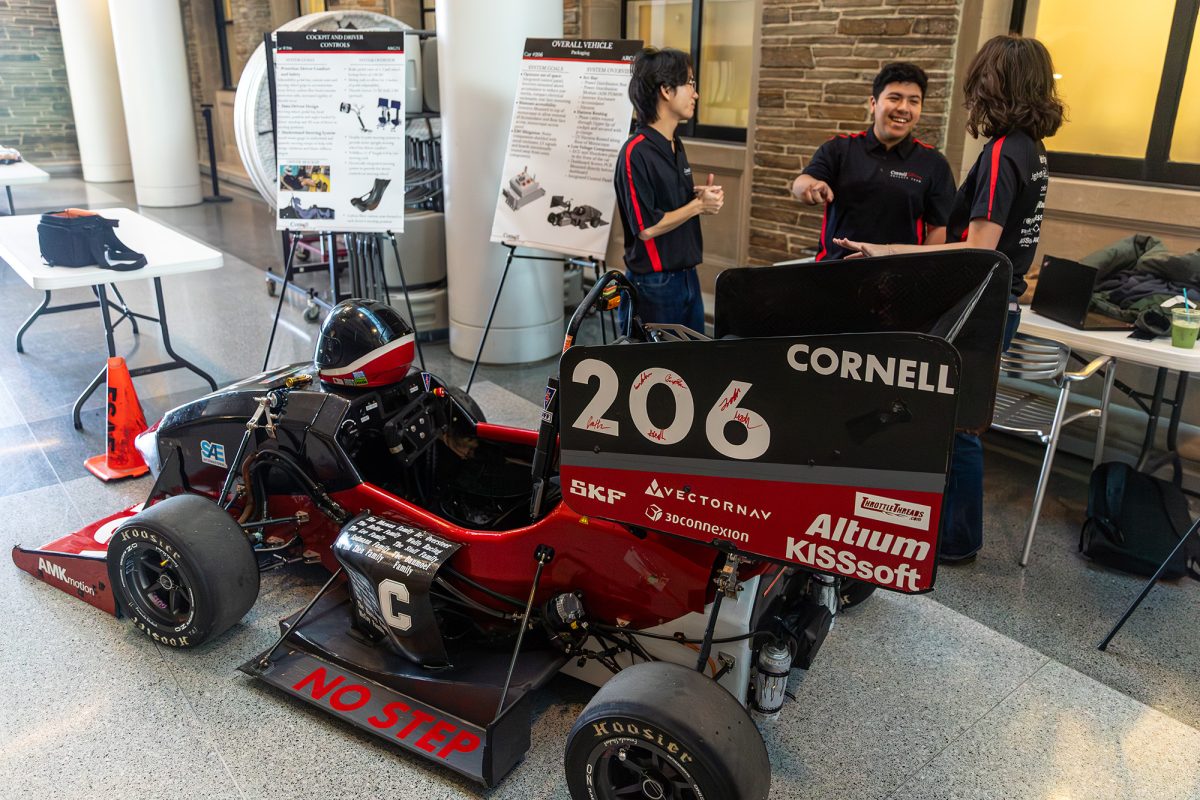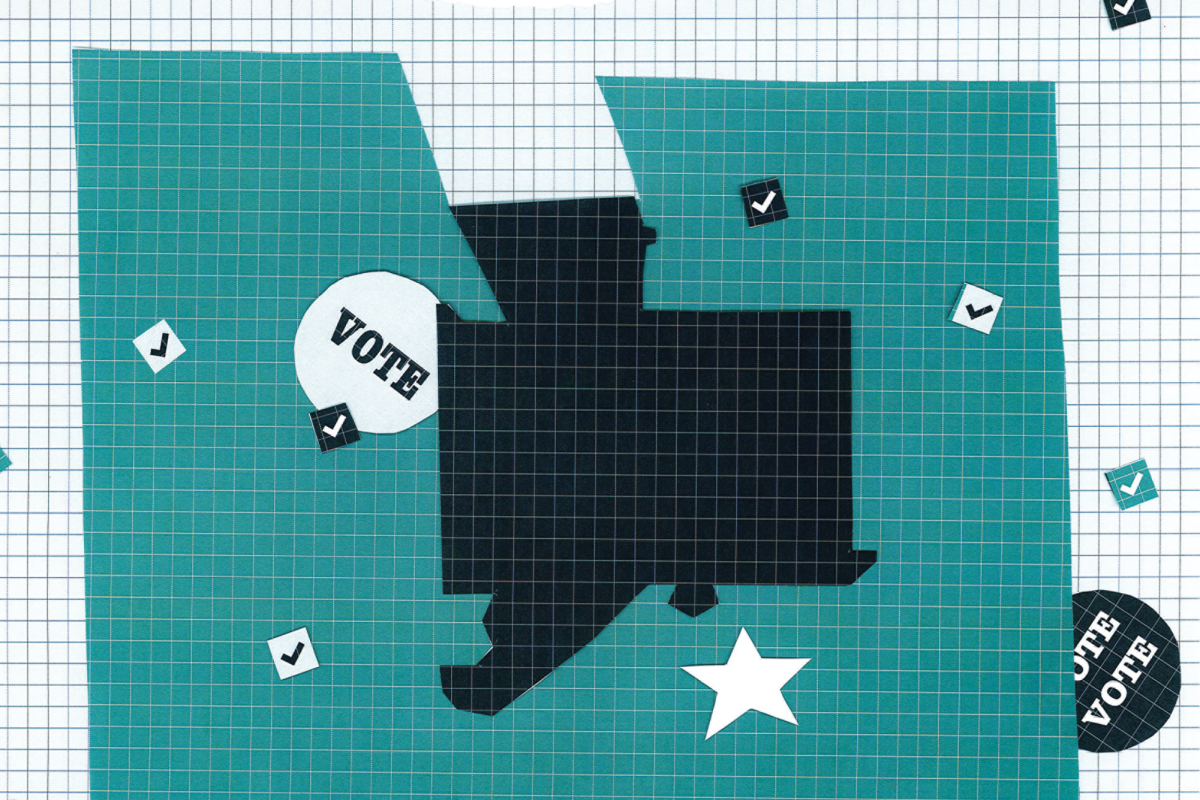On Nov. 29, 2022, Ithaca College announced its plans to upgrade its natural grass football field to artificial turf. Just under a year later, the Ithaca College football team is preparing to compete on Bertino Field at Butterfield Stadium for the first time.
Funded entirely by a $3 million donation from Monica Bertino Wooden ’81, the installment of the artificial turf began in mid-June 2023. The project also included the addition of stadium lights. Despite the football team’s scheduled homecoming on Sept. 30, the college does not expect to receive a complete certificate of occupancy until mid-October.
Tim Downs, chief financial officer and vice president of finance and administration, said the college received a temporary certificate of occupancy Sept. 15, which allows activity to take place on the field in the meantime. The varsity football team conducted its first practice on the new field that day, while the junior varsity team hosted a scrimmage under the lights that evening.
Downs said the TCO will remain in effect for as long as the college needs it to while finishing touches on the project are completed.
“It means you’ve met most of the requirements and a lot of the stuff that remains are things like the landscaping or fencing. … It’s stuff that’s not essential,” Downs said. “There are certain things that have to be done to get a TCO, but then we can operate with the TCO for as long as we need to until we finish the other items.”
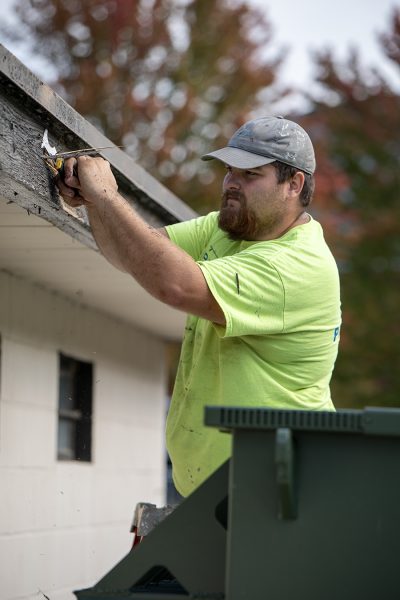
The field’s construction began in June 2023 following the college’s acquisition of the necessary permits. Downs said that the process of receiving the correct permits was one of the largest challenges of the project and a primary reason that the field was not completed prior to the beginning of the academic year.
“The town of Ithaca only has a certain number of staff, so getting through the planning and zoning board process was something we wanted to work through in a timely manner so that we could get the approval to install the project we wanted,” Downs said. “We knew it was going to be tight. … We went to the zoning and planning board on May 15 and 16 and then we had to wait for our construction permit. Once we got that, we could actually begin construction.”
Fortunately for the college, the football team’s initial three weeks of competition were scheduled away games beginning Sept. 2. Although coincidental, Downs said the predetermined schedule worked in favor of the construction team.
“It’s unusual to hear anyone say, ‘Oh, it was fine. We had plenty of time,’” Downs said. “Every schedule is always compressed and tight. Part of the trick here is most of the work we tried to do is during the summer and our big deadline was we had to be done before the start of the football season. Missing that wasn’t really an option.”
Since being granted the TCO, Bertino Field has become the football team’s primary practice field. In seasons past, the team would play on Yavits Field — adjacent to the Peggy Ryan Williams Center — to avoid tearing up the natural grass field at Butterfield Stadium prior to game days.
Lloyd Howell, executive director of the NFL Player’s Association, released a statement Sept. 13 calling for the removal of all artificial turf in NFL stadiums. The statement was released following New York Jets quarterback Aaron Rogers suffering a season-ending achilles injury Sept. 11 at MetLife Stadium.
“The data is clear that grass is simply safer than artificial turf,” Howell said in the statement. “It is an issue that has been near the top of the players’ list during my team visits and one I have raised with the NFL.”
Despite concern for turf-related injuries expressed by members of the campus community, senior wide receiver Sam Kline said there is more enthusiasm from his teammates surrounding the project than there are drawbacks. Kline said he is excited to have a more consistent playing surface to practice on, as the natural grass can sometimes be unpredictable and inconvenient.
“Practicing on these practice fields … once it rains a few times, they get pretty messed up and it’s honestly a lot of extra fatigue on the legs that you just don’t need when you practice on grass like that,” Kline said. “I like turf, personally. You just feel faster and it’s a lot easier on your legs, especially when you’re practicing all the time.”
Sophomore Isaiah Gordon attended all of the football team’s home games during the 2022 season and said he looks forward to seeing the new field in action. Gordon said that he played on turf fields throughout his high school soccer career and that he grew to prefer them over natural grass.
“I like the new stadium, the colors are much more vibrant,” Gordon said. “I do realize that some people prefer the grass because of the history it holds, but I think that turf is the better choice for the athletes on the field.”
While training in the off-season during the spring semester, the football team often finds time to practice and condition on the artificial turf at Higgins Stadium. During the fall semester, however, in-season sports — like men’s and women’s soccer and field hockey — have priority over the field, making it difficult to secure time slots.
Head coach Mike Toerper said that for the sake of having a consistent practice schedule, the team has not practiced on artificial turf at home prior to the installment of Bertino Field. The team’s first three competitions at Johns Hopkins University, RV Endicott College and Alfred University were all played on artificial turf fields.
Toerper said although there is no turf-specific training plan, the team’s warm-up sequence is designed to prevent injuries regardless of the playing surface.
“We’re always stretching and having intent behind our stretches in our dynamic warmups, but it doesn’t have to do specifically with the turf,” Toerper said. “We always start with a dynamic warmup where we’re bursting for five yards and then coming to a balanced stop. It just gets your system ready for the explosiveness and high-intensity training that’s about to take place. It also really stabilizes your knees and gets the body used to starting and stopping quickly.”
Victor Brown, head strength and conditioning coach, declined to comment on the progression of the team’s injury prevention program as they transition full-time from natural grass to artificial turf.
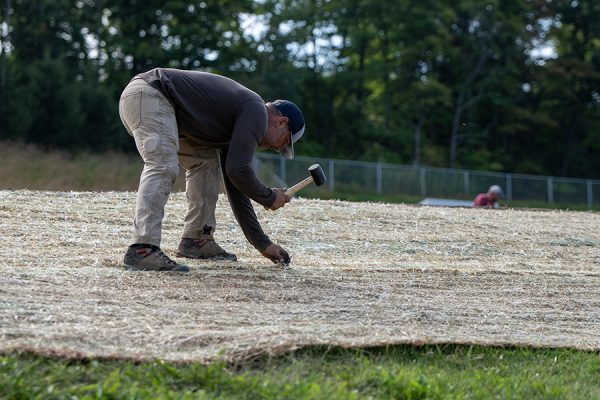
Clark Companies, the supplier of the field turf, is the same company that built the artificial turf field at MetLife Stadium, home of the New York Giants and New York Jets. Currently, MetLife ranks eighth on the list of injuries per NFL game with 4.7 — it is one of seven artificial turf fields in the top 10. Clark Companies is also responsible for building many collegiate turf fields in the Northeast region, including Schoellkopf Field at Cornell University.
Chenango Contracting — the company that resurfaced the field at Higgins Stadium in 2017 — has taken the lead for the installation of Bertino Field. Ernie McClatchie, associate vice president in the Office of Facilities, said the college’s long-standing relationship with the firm made him feel more comfortable when looking toward the end product.
“We’ve had very good luck with them at Higgins [Stadium],” McClatchie said. “They’re very well known in the region and a good, reputable company. We really didn’t need to look elsewhere when considering the installation process.”
Toerper emphasized that regardless of the surface they are playing on, the Bombers are largely looking forward to showcasing their talents at home once again. For games on the road, the football team is unable to travel every athlete on the roster — something Toerper said can be challenging.
“This is a group that, because we were on the road for the first three weeks, travel is not really something that’s a problem for us,” Toerper said. “I will say it’ll be nice to have the whole team there, which we don’t get to have on the road. That’s what I’m most excited about — the whole team will be present and able to cheer on our guys that are on the field.”
The football team will take to Bertino Field at Butterfield Stadium for the first time at 1 p.m. Sept. 30 when it opens conference play against the Statesmen of Hobart College. Kline said that after competing on the road for the first three weeks of the season, he is ready to make the most out of his time on the field wherever it may be.
“It’s awesome to play at home but, you gotta do what you gotta do,” Kline said. “Our coach always says you have to control what you can control and that’s not something we can control. We just go out there and play football, it doesn’t matter where.”


